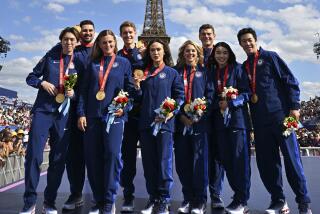Not Stepping on Any Toes
- Share via
SALT LAKE CITY — If the fix is in for the Olympic ice-dancing competition, as was rumored during one of the most contentious weeks in figure skating’s history, there was no sign of it Friday at the Salt Lake Ice Center.
To be sure, ice dancing hasn’t been turned inside out in the wake of a judging scandal in the pairs competition that Friday led to the indefinite suspension of a French judge for not immediately reporting attempts to influence her vote.
The order of the top 10 ice dance couples after the first compulsory dance, the quickstep, was the same after the second dance, the blues. And there were the usual expressions of frustration from competitors who find it difficult to climb in the rankings from the middle of the pack to the top five or six.
But there was little to raise eyebrows about in the first phase of the competition, which counts for 20% of each couple’s final score.
Marina Anissina and Gwendal Peizerat of France, the favorites, were first, followed by Irina Lobacheva and Ilia Averbukh of Russia and world champions Barbara Fusar-Poli and Maurizio Margaglio of Italy. Grand Prix champions Shae-Lynn Bourne and Victor Kraatz of Canada were fourth, just ahead of Margarita Drobiazko and Povilas Vanagas of Lithuania.
The Globe and Mail, a Canadian newspaper, said earlier this week the judges had predetermined the Italians, Russians, French, Lithuanians and Canadians would finish in that order.
Those countries were represented in the top five Friday, but not in the predicted order.
Only a few ice dancers were willing to discuss the pairs controversy and whether it would affect them.
“The solution was a good idea,” Germany’s Rene Lohse said of the International Olympic Committee’s decision to elevate Jamie Sale and David Pelletier of Canada to co-gold medalists with Elena Berezhnaya and Anton Sikharulidze of Russia. “But the big question is what about the future?”
Peizerat said he and his partner, two-time European champions and 2000 world champions, don’t want to hear about the pairs fuss.
“It is something of sport, not on ice,” he said. “We are focusing on the way we skate and our choreographies.”
Averbukh also said he’s focusing on his own competition.
“Each one has his own profession to practice,” he said. “You [reporters] write stories and publish them. We skate. We skate our best and put out the best performance.”
Fusar-Poli had nothing to say at all, apparently disappointed by being third.
U.S. champions Naomi Lang and Peter Tchernyshev are 11th. Beata Handra and Charles Sinek, who finished fourth at last month’s U.S. championships but won an Olympic berth because the second- and third-place duos didn’t meet citizenship requirements, are 20th.
Asked if the judging in ice dancing is fair, Lang paused to think.
“I don’t really have an answer for that,” she said. “For us, we just have to wait our turn. It’s painful sometimes.
“We’re going to wait it out. We will be there someday. It’s just a matter of time.”
More to Read
Go beyond the scoreboard
Get the latest on L.A.'s teams in the daily Sports Report newsletter.
You may occasionally receive promotional content from the Los Angeles Times.







